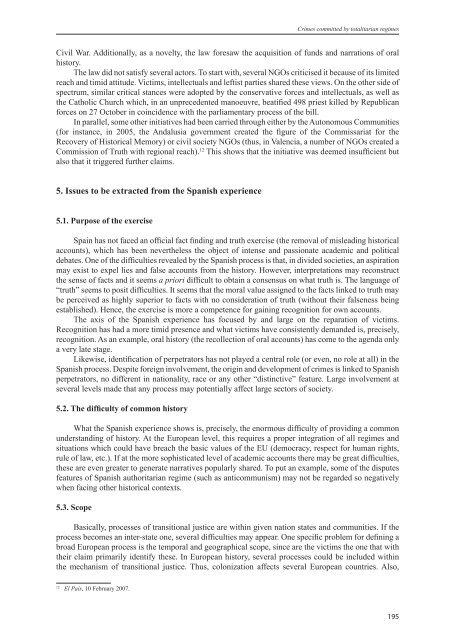crimes committed by totalitarian regimes - Ministrstvo za pravosodje
crimes committed by totalitarian regimes - Ministrstvo za pravosodje
crimes committed by totalitarian regimes - Ministrstvo za pravosodje
Create successful ePaper yourself
Turn your PDF publications into a flip-book with our unique Google optimized e-Paper software.
Crimes <strong>committed</strong> <strong>by</strong> <strong>totalitarian</strong> <strong>regimes</strong><br />
Civil War. Additionally, as a novelty, the law foresaw the acquisition of funds and narrations of oral<br />
history.<br />
The law did not satisfy several actors. To start with, several NGOs criticised it because of its limited<br />
reach and timid attitude. Victims, intellectuals and leftist parties shared these views. On the other side of<br />
spectrum, similar critical stances were adopted <strong>by</strong> the conservative forces and intellectuals, as well as<br />
the Catholic Church which, in an unprecedented manoeuvre, beatified 498 priest killed <strong>by</strong> Republican<br />
forces on 27 October in coincidence with the parliamentary process of the bill.<br />
In parallel, some other initiatives had been carried through either <strong>by</strong> the Autonomous Communities<br />
(for instance, in 2005, the Andalusia government created the figure of the Commissariat for the<br />
Recovery of Historical Memory) or civil society NGOs (thus, in Valencia, a number of NGOs created a<br />
Commission of Truth with regional reach). 12 This shows that the initiative was deemed insufficient but<br />
also that it triggered further claims.<br />
5. Issues to be extracted from the Spanish experience<br />
5.1. Purpose of the exercise<br />
Spain has not faced an official fact finding and truth exercise (the removal of misleading historical<br />
accounts), which has been nevertheless the object of intense and passionate academic and political<br />
debates. One of the difficulties revealed <strong>by</strong> the Spanish process is that, in divided societies, an aspiration<br />
may exist to expel lies and false accounts from the history. However, interpretations may reconstruct<br />
the sense of facts and it seems a priori difficult to obtain a consensus on what truth is. The language of<br />
“truth” seems to posit difficulties. It seems that the moral value assigned to the facts linked to truth may<br />
be perceived as highly superior to facts with no consideration of truth (without their falseness being<br />
established). Hence, the exercise is more a competence for gaining recognition for own accounts.<br />
The axis of the Spanish experience has focused <strong>by</strong> and large on the reparation of victims.<br />
Recognition has had a more timid presence and what victims have consistently demanded is, precisely,<br />
recognition. As an example, oral history (the recollection of oral accounts) has come to the agenda only<br />
a very late stage.<br />
Likewise, identification of perpetrators has not played a central role (or even, no role at all) in the<br />
Spanish process. Despite foreign involvement, the origin and development of <strong>crimes</strong> is linked to Spanish<br />
perpetrators, no different in nationality, race or any other “distinctive” feature. Large involvement at<br />
several levels made that any process may potentially affect large sectors of society.<br />
5.2. The difficulty of common history<br />
What the Spanish experience shows is, precisely, the enormous difficulty of providing a common<br />
understanding of history. At the European level, this requires a proper integration of all <strong>regimes</strong> and<br />
situations which could have breach the basic values of the EU (democracy, respect for human rights,<br />
rule of law, etc.). If at the more sophisticated level of academic accounts there may be great difficulties,<br />
these are even greater to generate narratives popularly shared. To put an example, some of the disputes<br />
features of Spanish authoritarian regime (such as anticommunism) may not be regarded so negatively<br />
when facing other historical contexts.<br />
5.3. Scope<br />
Basically, processes of transitional justice are within given nation states and communities. If the<br />
process becomes an inter-state one, several difficulties may appear. One specific problem for defining a<br />
broad European process is the temporal and geographical scope, since are the victims the one that with<br />
their claim primarily identify these. In European history, several processes could be included within<br />
the mechanism of transitional justice. Thus, coloni<strong>za</strong>tion affects several European countries. Also,<br />
12<br />
El País, 10 February 2007.<br />
195




